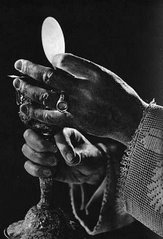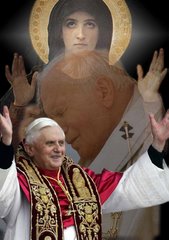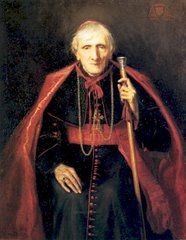From a letter of Florida Parousian Ben Burwell to a Protestant friend:
"You brought up the question: Why do Catholics believe Mary was conceived without sin when the Bible says in Romans 3:10 “…as it is written: ‘None is righteous, no, not one.’” Well, I found that James 5:16 says “The fervent prayer of a righteous person is very powerful.” If absolutely no one is righteous, then who is James talking about? Luke 1 says that Elizabeth and Zechariah were righteous before God. If absolutely no one is righteous, then how can this be?
As you said, scripture does not contradict itself. To say that absolutely no one, without exception, is righteous is a misinterpretation of the passage. For the passage states “it is written” in reference to an excerpt taken from Psalm 14 which says “the fool says in his heart, ‘There is no God. They are corrupt….there is none that does good.” Later that same Psalm goes on to talk about the “righteous.” So, if none has done good, who are these righteous the psalm is referring to? Therefore it is important to remember that when the psalmist says “none has done good”, he is talking about the fools who say “There is no God.” He’s not referring to absolutely everyone. Also it’s important to look at the context and the audience. He is speaking to Roman Jews and Gentiles not Christians. He is warning them not to be like the fools that deny God but instead to become righteous through faith in Jesus Christ (Romans 3:21).
The verse which says “…all have sinned and are deprived of the glory of God” would suggest that “all” describes every member of the family of Adam. However, it cannot be the entire family of Adam for if it were, Jesus would be included. And as we know from Luke 3:23-38, Jesus is a son of Adam, yet he was sinless (Heb.4:15). Further, Paul clearly states that there is a time in each person's life when he has not yet done any wrong. He describes how Jacob and Esau, when they were yet unborn, "had done nothing either good or bad" (Rom. 9:11). Therefore, Paul is finding exception among those who are too young to commit personal sin and those who play a unique role in the history of salvation. This opens the possibility that Mary is not subject to the restrictions of “all”. If there is an exception for Jesus, the Second Adam, there can be an exception for Mary, the Second Eve. I do not mean to disprove or invalidate the words used in Sacred Scripture, I mean only to clarify the context so as to understand it as clearly as possible.
Gen 3:15
I will put enmity between you (the serpent, Satan) and the woman (Mary), and between your offspring (minions of Satan) and hers (Jesus); He will strike at your head, while you strike at his heel
If there had ever been a time when Mary was under Satan’s domination through personal or original sin, then there would not be a real enmity between her and Satan. Therefore, by virtue of the grace He gave her, God put Mary in opposition to Satan from the beginning and throughout her life. Notice that God the Father says that *He will put* the enmity between her and Satan. Only in God, and by His gift of grace, also in Mary, can it be said that there is enmity with Satan because only in them is their entire life opposed to Satan.
Jesus came to earth and fulfilled the Old Testament Law perfectly and completely. And this Law is especially manifested in the Ten Commandments. Now, the fourth commandment says that He is called to honor His Father and His mother. However, to allow His mother to participate in the Fall would be to allow her to be dishonored. If He is to honor her, then He can not allow this.
Another point to consider is that Jesus is the only person who was able to choose His own mother. He was able to choose the holiest human woman. And being a perfect Son, He loved His mother more than any other son. And being a loving Son, He would not want His mother to spend one second in Satan’s domination. No sin or anything tainted with sin can stand in the face of the holiness of God. "Enmity" is that mutual hatred between Mary and sin, between Christ and sin.
Mary’s sinlessness can also be seen in comparison to the Ark of the Covenant. The original ark was clearly a holy vessel. God meticulously outlined the construction (Ex 25:10-22) and the Holy Spirit inspired the artisan who formed it (31:2-3). It was made from the finest, purest materials and consecrated to the service of God in the Tabernacle. The Ark had to be perfect and holy, worthy to bear the awesome Presence of the Holy One of Israel.
So if an inanimate object could be so holy, how much more holy must Mary have been? In order to be a worthy vessel for the all-holy God, she had to be spotless and without blemish. Like the original ark, she was set apart for that sacred task from the beginning of her existence. This is why Jesus preserved her from contracting original sin by applying the sin-cleansing merits of His Precious Blood to her beforehand which is only possible because God is under no restriction of time.
To say that Mary was without sin does not in any way suggest that she did not need the redeeming grace of Jesus’ death and resurrection. For she says herself in Luke 1:47 “My spirit rejoices in God my savior.” Mary was indeed saved, but in a special way. From the moment of conception she was set apart. God did not just choose any woman. His plan for our salvation was perfect and I doubt that he grew impatient in granting us salvation. After all the entire Old Testament (with all of its trials, triumphs and historical events) builds upon itself pointing to one great event; the arrival of Jesus Christ the Messiah.
But this is not to say that God impeded upon her free will in any way. Mary’s “yes” to God was not a result of being born without sin; rather it was because God knew how she would respond that He chose her. She was a living example of how God intended all humans to be—in perfect union with him. She was created without sin just as Adam and Eve. She had free will just as they did but rather than denying God’s gift as Adam and Eve did, she said YES to the gift. Her openness to receiving God’s love (by her own free will) was so complete that she literally conceived the love of God within her.
It is necessary to keep in mind that Catholic do not make Mary important by any claim of our own. It is God who made Mary worthy of being honored. At the Annunciation, Saint Gabriel the Archangel greets Mary with the words, “Hail, full of grace, the Lord is with you” (Lk. 1:28). The phrase “full of grace” is a translation of the Greek word kecharitoméne which is a rare conjugation of the verb charitoo, implying that the grace endowed upon Mary was complete, perfect, and enduring. In his 1986 encyclical on Mary as Mother of the Redeemer, Pope John Paul II teaches that “the messenger greets Mary as ‘full of grace’; he calls her thus as if it were her real name. He does not call her by her proper earthly name: Miryam (= Mary), but by this new name: ‘full of grace’”
As Catholics we believe that Mary intercedes on our behalf, presenting our petitions to Christ in a way that is perfect. We do not pray to her, but through her. When she requested that Jesus perform his first miracle at the Wedding feast of Cana, he obeyed the wish of his mother. How great is it to know that the mother of God prays on our behalf!
The love Mary had for Jesus provides us an example of how we are called to love Him. That is why Mary is recognized among Catholics as playing a major role in God’s plan for our salvation. So the question we have to ask ourselves is: Are we above God that we should overlook Mary in our quest to grow closer to Christ when He humbly came to us through her. Yes, it is true we do not need her, but neither did God. He could have come to earth as a full grown man or mighty warrior.
We are all seeking truth and Jesus Christ himself is Truth. Catholics do not claim to have all the answers nor can we boast that we understand fully those that God has made known to us. It is through faith that we are constantly seeking to know God based on what he has revealed of Himself in Word and Spirit. Although Scripture is the inspired word of God and our ultimate guide, we believe that God did not just use the Bible as and instruction manual and our only “clue” to discovering Him. We believe that God speaks to us everyday making Himself known to us more fully and completely.
My prayer for you is that you will be guided by the Holy Spirit and never grow tired in your quest for Truth. And may you have the heart of Mary who submitted without reservation to the will of God. And may she teach you to love her Most Holy Son with the same love she had.
I want to thank you for challenging me to reflect on my beliefs in a deeper way and inspiring me to be open in sharing my faith with others. Your thirst for wisdom and understanding is evident in your patience and openness and I admire you greatly for that. I hope our friendship continues to grow. With Christ at the center, I know we can learn a lot from each other."
Monday, January 29, 2007
Subscribe to:
Post Comments (Atom)






1 comment:
What an awesome post. I would only add in furtherance of the catholic position John 19:26-27 [When Jesus saw his mother and the disciple there whom he loved, he said to his mother, "Woman, behold, your son." Then he said to the disciple, "Behold, your mother." And from that hour the disciple took her into his home.] This passage means to me that Jesus gave us his mother to be our mother.
I recently heard Father Corapi discuss the significance of praying the Rosary. To pray the Rosary is to pray the Gospel. What is better? To read or to pray? Every part of the Rosary comes from the Gospel. Even the "Hail Mary" comes from the Gospel (Luke 1:28-29 & 42-43). What is the Gospel? The Good News. What is the Good News? Someone not something! The Good News is Jesus! So when we pray the Rosary we pray Jesus!
God Bless!
Post a Comment